Step-by-Step Guide: How to Check Your Own Criminal Background
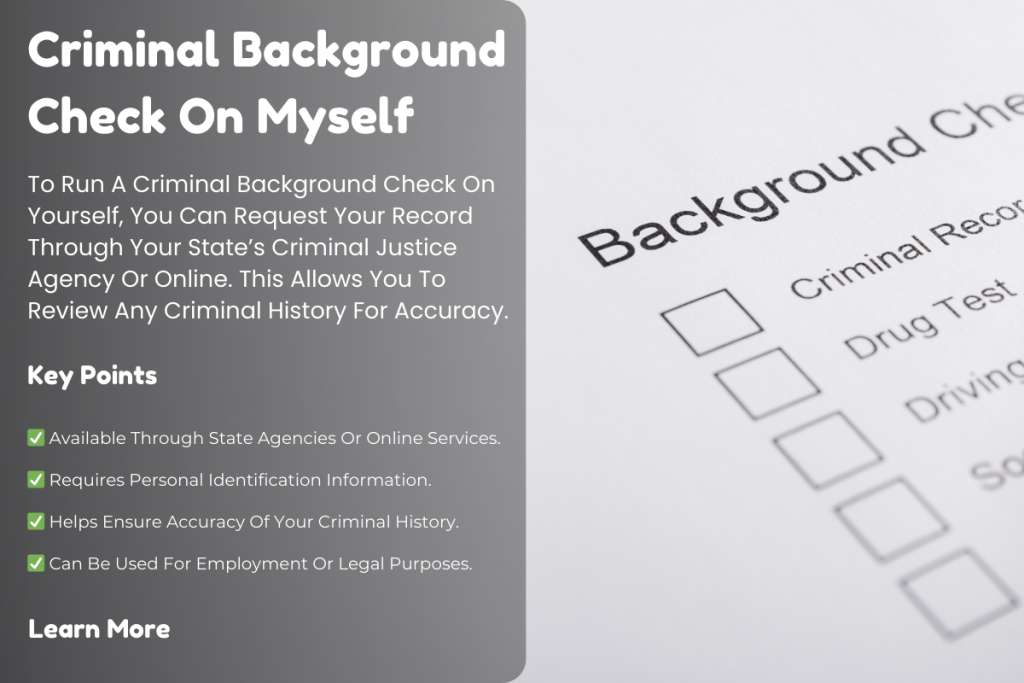
Introduction to Criminal Background Checks and Why You Should Check Your Own
A criminal background check is an official record of an individual’s criminal history, which includes information about past arrests, convictions, warrants, and other law enforcement actions. This check is typically used to screen individuals for various purposes such as employment, housing, loans, or legal matters. Criminal background checks can vary depending on the jurisdiction and the type of check requested, which may include local, state, or national records.
In the United States, law enforcement agencies, employers, landlords, and even banks may use criminal background checks to assess the reliability, trustworthiness, and safety of individuals. These checks are essential tools for preventing fraud, hiring qualified candidates, ensuring safety in housing, and protecting the public from individuals who may pose a risk due to past criminal behavior.
Why Should You Check Your Own Criminal Background?
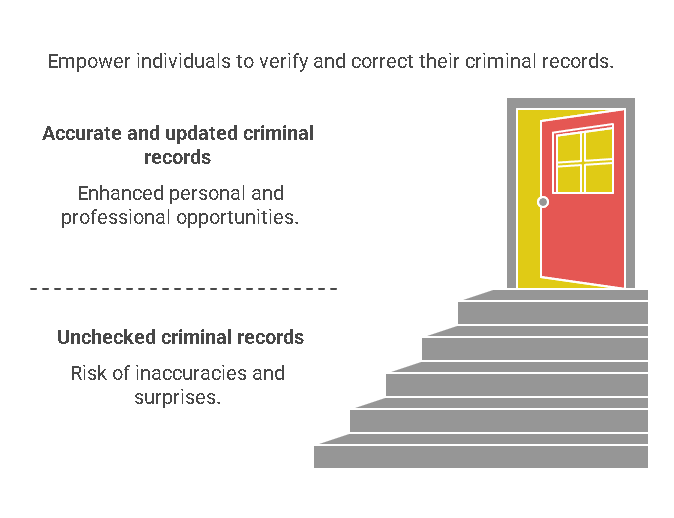
Checking your own criminal background is an essential step to ensure that your records are accurate and up-to-date. Here are several reasons why you should check your criminal record regularly:
- Avoid Surprises: Criminal background checks are frequently conducted by potential employers, landlords, and lending institutions. If there is a criminal record on file, it could impact your ability to secure a job, housing, or even a loan. Checking your own record gives you the opportunity to address any issues before they affect your personal or professional life.
- Ensure Accuracy: Sometimes, errors or outdated information may appear on your criminal record. These could be clerical mistakes, expired charges, or records that should have been sealed or expunged. By reviewing your record, you can spot these inaccuracies and take the necessary steps to correct them.
- Improve Employment Opportunities: For many jobs, especially those in law enforcement, healthcare, finance, or positions involving children or vulnerable adults, employers may require a clean criminal record. By regularly checking your background, you can ensure that it remains free of errors that may prevent you from being considered for a job.
- Monitor for Identity Theft: A criminal background check can also help identify if someone has used your personal information to commit crimes. If you spot a criminal record that doesn’t belong to you, it may be a sign of identity theft.
- Legal Peace of Mind: Knowing your criminal record is up to date gives you peace of mind, especially if you’re navigating legal matters. If you’re involved in a lawsuit or a legal dispute, an accurate criminal background check can make a significant difference.
What Information Is Included in a Criminal Background Check?
Criminal background checks typically contain several key pieces of information, which may include:
- Arrests: This section will detail any arrests made by law enforcement, regardless of whether or not charges were filed. Arrest records are included even if the individual was not convicted of the crime.
- Convictions: This section lists the criminal convictions for which the individual has been found guilty in court. It includes both felony and misdemeanor offenses and may also show any related sentences, such as probation or imprisonment.
- Warrants: If there are any active warrants for an individual’s arrest, this information will be displayed in the criminal background check.
- Court Cases: Information regarding criminal court cases, including the charges filed and the final verdict, will be included. This section can help clarify the outcome of cases, such as dismissals or verdicts.
- Sex Offender Status: Depending on the jurisdiction, some checks will include whether an individual is listed on a sex offender registry.
- Expunged or Sealed Records: If an individual has had certain criminal records expunged or sealed, these may not appear in background checks. However, this varies by state, and it’s important to check for any past offenses that may still be accessible.
Overview of the Process: How to Get a Criminal Background Check on Yourself
Obtaining a criminal background check on yourself is a straightforward process, but the steps involved can vary depending on how you choose to go about it. There are several methods to request your criminal history, each with its own process, time frame, and associated fees. Here’s a general outline of the most common routes:
- Local Police or Sheriff’s Department: You can request your criminal background check from your local police department or sheriff’s office. This method generally involves filling out forms, providing proof of identity (such as a government-issued ID), and sometimes submitting fingerprints. Processing times can vary, and there may be a fee associated with the request.
- State Government Websites: Many states offer online portals where you can request your criminal background check. These websites, such as the Texas Department of Public Safety (DPS), provide access to state-specific records. Fees for state background checks typically range from $10 to $50, depending on the jurisdiction.
- Federal Background Check via the FBI: If you need a comprehensive, nationwide criminal background check, you can request it directly through the Federal Bureau of Investigation (FBI). The FBI provides a Criminal History Summary Check, which is a national database that includes information about arrests and convictions across the country.
- Third-Party Services: There are also private companies like Precisehire that offer criminal background check services. These third-party services typically provide a quick and easy way to access both local and national criminal records. Many individuals and businesses use third-party services for bulk background checks, as they offer fast processing times and additional features such as continuous monitoring, employee screening, and verification of criminal history.
You have the right to access your own criminal background record, and it’s important to note that each of these methods allows you to view your record for personal use. If you discover errors or outdated information, you can dispute or challenge it through the relevant law enforcement agency.
By knowing your criminal history and understanding the process of obtaining a criminal background check, you can ensure that you’re prepared when it comes to personal and professional matters. Whether you’re applying for a job, housing, or navigating legal challenges, checking your criminal background can provide valuable insight and help you avoid surprises.
We will dive deeper into the specific methods of obtaining your criminal background check, with a focus on the advantages, disadvantages, and steps involved in each option. Additionally, we will include helpful information about third-party services like Precisehire, which can streamline the background check process and help you gain access to detailed criminal records for various purposes.
Methods of Obtaining Your Criminal Background Check
When it comes to checking your criminal background, there are several methods available. Each has its own advantages and considerations based on convenience, time, and specific requirements. In this section, we’ll walk you through the most common methods to obtain your criminal background check, and provide a comparison of their features to help you decide the best option for you.
Method 1: Requesting a Criminal Background Check through Local Police or Sheriff’s Department
One of the most traditional methods for obtaining a criminal background check is to request it directly from your local police department or sheriff’s office. This process typically involves visiting or contacting your local law enforcement agency to fill out an official request form. The process may differ slightly depending on your jurisdiction, but here’s a general outline of the steps involved:
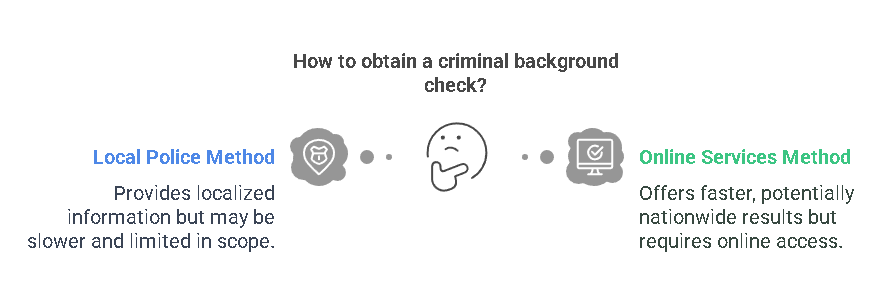
Step-by-Step Guide to Requesting a Background Check from Local Police:
- Visit the Local Law Enforcement Agency: Head to your local police department or sheriff’s office. Some agencies may allow you to initiate the request online, while others may require an in-person visit.
- Complete the Request Form: You will need to fill out a background check request form. This form typically requires personal details such as your full name, date of birth, address, and contact information.
- Provide Identification: You may be asked to provide proof of identity, such as a valid driver’s license, passport, or government-issued ID.
- Submit Fingerprints (if Required): In some jurisdictions, you may be asked to submit fingerprints as part of the background check process. Fingerprint cards are often provided by the police department.
- Pay the Fee: Most police departments charge a fee for processing the background check. Fees can vary from $10 to $50, depending on your location and the specifics of your request.
- Wait for Processing: The processing time for a criminal background check from local law enforcement can range from a few days to several weeks. This depends on the complexity of the check, your jurisdiction, and the method of delivery (mail or in-person pick-up).
Advantages and Disadvantages of Local Police Background Checks:
- Advantages:
- It provides the most localized and specific information about your criminal history within your jurisdiction.
- Ideal if you need a background check for state or local legal matters.
- You can verify the accuracy of the records with the police department directly.
- Disadvantages:
- The process can be slower than other methods, especially if you have to wait for fingerprinting and processing.
- Limited to the records within your specific state or locality, which may not cover nationwide arrests or convictions.
Method 2: Online Background Check Services (e.g., Texas Department of Public Safety, FBI)
If you’re looking for a faster and more convenient way to obtain your criminal background check, you can access online services provided by official government agencies. Many states, including Texas, offer online portals through which you can request your criminal history record.
The FBI also provides an option for nationwide criminal background checks, allowing you to request a report that covers all states and jurisdictions. Here’s how to go about using online government services:
Step-by-Step Guide to Obtaining a Background Check Online:
- Visit the Official Website: Depending on where you live, you will need to visit the appropriate government website. For example, the Texas Department of Public Safety (DPS) offers online background checks, and the FBI provides the Criminal History Summary Check.
- Create an Account or Log In: To access your background check, you may need to create an account or log into an existing one. You will be required to provide personal information to verify your identity.
- Complete the Request Form: Fill out the required information on the form, including your full name, address, and other identifying details such as your Social Security number or driver’s license number.
- Pay the Fee: There is typically a fee for this service. The price may range from $10 to $50, depending on the state or federal service you are using.
- Receive the Report: Once your request is processed, you will receive your criminal background check report. Most online services provide instant or same-day results, although in some cases, you may need to wait a few days for processing.
Advantages and Disadvantages of Online Background Checks:
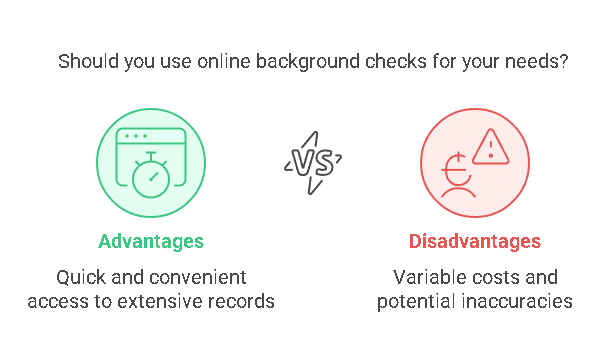
- Advantages:
- Instant or fast processing, with many checks being completed within minutes or days.
- Access to a wider range of records, including state, national, and federal databases.
- Convenient for individuals who prefer online services over in-person visits.
- Disadvantages:
- Costs may vary depending on the state or service.
- Some records may be unavailable depending on the jurisdiction, especially if you require highly localized information.
- There’s a potential for discrepancies if your state’s records aren’t up to date.
Method 3: Using Third-Party Services Like Precisehire
For individuals looking for a more comprehensive, hassle-free experience, third-party background check services like Precisehire can be a great option. These services offer quick, accurate, and detailed criminal background checks that encompass multiple jurisdictions, and in some cases, additional features like continuous monitoring and report updates.
Third-party services are commonly used by businesses for pre-employment screening, but they can also be beneficial for personal background checks.
Step-by-Step Guide to Using Third-Party Services:
- Choose a Service: Select a reputable third-party background check provider such as Precisehire. These companies offer specialized services tailored to individual or business needs.
- Provide Personal Information: To use these services, you will need to provide some basic identifying information. This includes your name, date of birth, and any other data required for the report.
- Select the Type of Check: Many third-party services allow you to choose between different types of background checks, such as local, state, or nationwide records.
- Review and Pay for the Service: Once you’ve chosen the type of background check, review the costs and proceed to payment. Most services charge a fee that can vary based on the level of detail and the number of records requested.
- Receive the Report: Third-party services typically provide instant access to your criminal background check results. These reports may include details from local, state, and national databases, depending on the service you’ve chosen.
Advantages and Disadvantages of Third-Party Services:
- Advantages:
- Fast and easy access to criminal background checks, especially for nationwide records.
- More comprehensive reports that may include continuous monitoring and alert notifications.
- Ideal for bulk checks or those needing reports for employment screening.
- Disadvantages:
- Costs can vary widely, and some services may charge more for detailed or extensive reports.
- Some services may not be as comprehensive or accurate as official government channels.
- Limited in cases where you need highly specific, localized information.
Example Table: Comparison of Criminal Background Check Methods
| Method | Timeframe | Cost | Ease of Access |
|---|---|---|---|
| Local Police Department | 1-2 weeks | Varies | Moderate |
| Online (Government Websites) | Instant/1-3 days | $10-$50 | Easy |
| Third-Party Service (Precisehire) | Instant | Varies | Very Easy |
Common Challenges in Obtaining Your Own Criminal Background Check
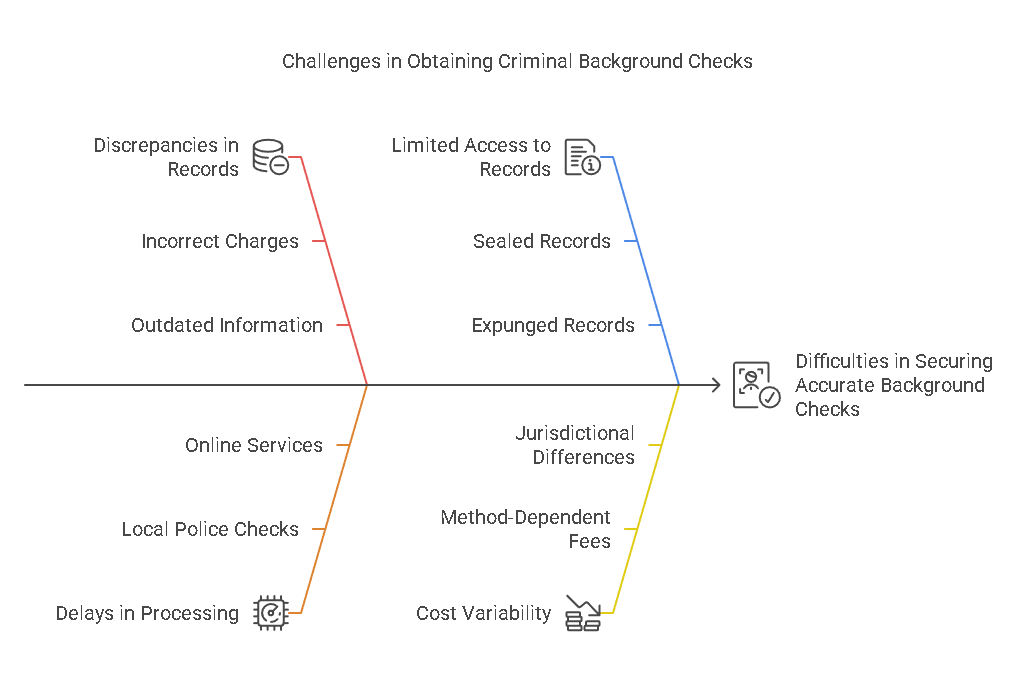
While obtaining your criminal background check is generally a straightforward process, there are a few common challenges you may face:
- Discrepancies in Records: Errors in your criminal record, such as incorrect charges or outdated information, can cause issues when applying for jobs or housing. It’s important to review your background check thoroughly and challenge any discrepancies with the relevant authority.
- Delays in Processing: Processing times can vary depending on the method you choose. Local police checks may take longer due to paperwork and fingerprinting, while online services may have occasional delays in retrieving state or federal records.
- Limited Access to Certain Records: In some cases, certain records may be sealed or expunged, meaning they will not appear on your background check. This can sometimes lead to gaps in the information provided, especially when using third-party services.
- Cost Variability: Fees for obtaining a background check can vary depending on the method, jurisdiction, and level of detail required. Be sure to understand the cost upfront to avoid any surprises.
Legal Aspects, FAQs, and Conclusion
In this final part, we will discuss the legal aspects surrounding criminal background checks, frequently asked questions, and summarize the essential points about obtaining your criminal background check. Ensuring that you are well-informed about your legal rights and responsibilities can help you better navigate the process of checking your criminal background, whether for employment, housing, or personal reasons.
Legal Aspects of Criminal Background Checks
Understanding the legal framework surrounding criminal background checks is crucial for anyone seeking to access or use such records. Here are the key legal considerations:
Your Right to Access Your Own Criminal Record
Under the Freedom of Information Act and other state-specific laws, you have the right to access your own criminal record. This means that you can request and obtain your criminal background check through various methods, including government websites, local law enforcement, or third-party services. It’s essential to know that this right is yours regardless of whether you have a criminal history.
Fair Credit Reporting Act (FCRA) and Criminal Background Checks
The Fair Credit Reporting Act (FCRA) is a key regulation that governs how background checks, including criminal checks, are conducted in the United States. The FCRA ensures that criminal background checks are conducted fairly, that consumers are informed when their information is being used, and that inaccurate or outdated information is corrected.
- If you request a criminal background check, the provider must ensure that the information is accurate, and you have the right to dispute any inaccuracies.
- The FCRA also mandates that employers or other entities conducting background checks must obtain your consent before running a criminal background check for employment purposes.
How Criminal Background Information is Used
Criminal background information can be used for several purposes, including:
- Employment Screening: Employers often use criminal background checks to screen job applicants, especially for roles that require security clearance or involve vulnerable populations.
- Housing Applications: Landlords and property managers may conduct background checks to ensure that tenants do not have a criminal history that could pose a risk to the property or other tenants.
- Loan Approvals: Some lenders may use criminal background checks as part of their assessment process, especially for loans that involve large sums or financial risk.
- Legal Matters: Criminal background checks can also be used in legal proceedings, such as for determining bail or parole eligibility.
What to Do if Your Background Check Reveals Incorrect or Outdated Information
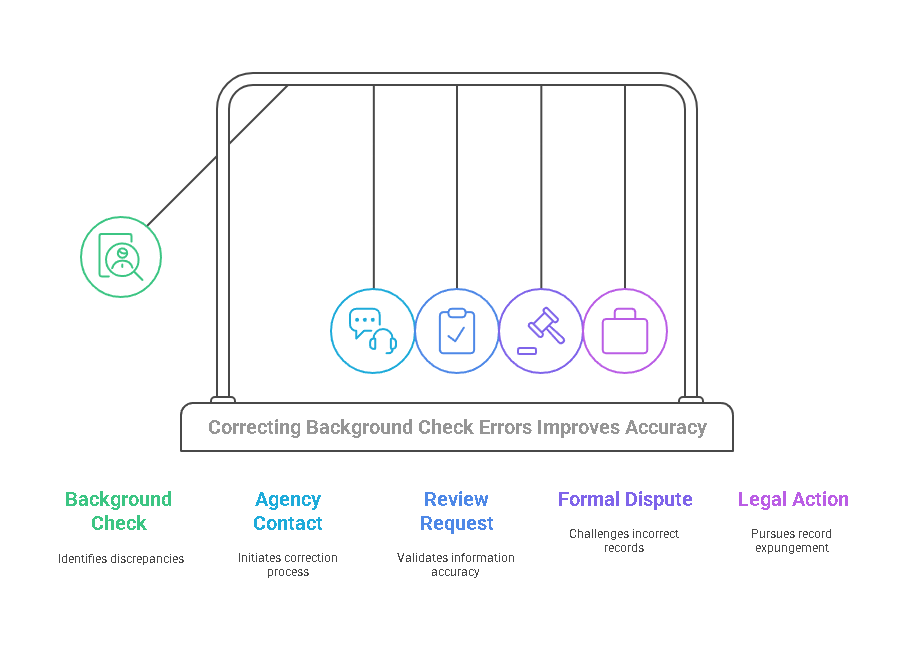
If you find discrepancies or outdated information on your criminal background check, it is important to take immediate steps to correct it. Here’s what you can do:
- Contact the Issuing Agency: If you discover an error in your criminal background, the first step is to contact the agency that issued the report. This could be the police department, the FBI, or the state’s department of public safety.
- Request a Review: Submit a request for a review of the information, providing any necessary documentation to prove that the record is incorrect or outdated.
- File a Dispute: If the agency does not resolve the issue, you can file a formal dispute, either through the agency or through a third-party service that specializes in criminal record corrections.
- Legal Assistance: In cases where the issue persists, you may want to seek legal advice to pursue more formal action, such as expunging the record.
FAQs: Frequently Asked Questions
Here are some frequently asked questions about obtaining a criminal background check on yourself:
Can I get my criminal background check if I have no criminal record?
Yes, you can still request your criminal background check even if you have no criminal record. The check will simply confirm that there are no entries in your record.
What do I do if my background check is incorrect?
If you find inaccuracies in your criminal background check, contact the agency or service that issued the report. You can request a correction and, if necessary, file a dispute to have the error removed from your record.
How long does it take to get a criminal background check on myself?
The time it takes to get a criminal background check depends on the method you choose. Online background checks can be completed instantly or within a few days, while requests through local police departments or third-party services may take up to a week or more.
What is the difference between a local and national criminal background check?
A local background check provides information from the police department or sheriff's office within your jurisdiction and typically only includes offenses committed in that specific area. A national background check, such as one conducted by the FBI, includes records from multiple jurisdictions and can offer a more comprehensive view of your criminal history.
Can a background check affect my job application?
Yes, a background check can impact your job application. Many employers conduct criminal background checks as part of their hiring process. Depending on the nature of the offense and the job requirements, a criminal record may affect your chances of being hired. However, some states and employers have policies that prohibit discrimination based solely on criminal history.
Conclusion
Checking your criminal background is an important step in understanding your legal history and protecting your personal and professional interests. Whether you’re applying for a job, renting an apartment, or seeking a loan, knowing what is on your criminal record can help you avoid surprises and take proactive steps to address any issues that may arise.
You have several options for obtaining your criminal background check, including through local law enforcement agencies, government websites, and third-party services like Precisehire. Each method has its benefits, and understanding which is right for you will help streamline the process.
If you find any inaccuracies in your background check, you have the legal right to dispute the information and ensure it’s corrected. Always stay informed about your rights and responsibilities to ensure a smooth process when checking your criminal record.
By taking control of your criminal background check, you can ensure that your information is accurate and up-to-date, allowing you to make informed decisions in both your personal and professional life.
